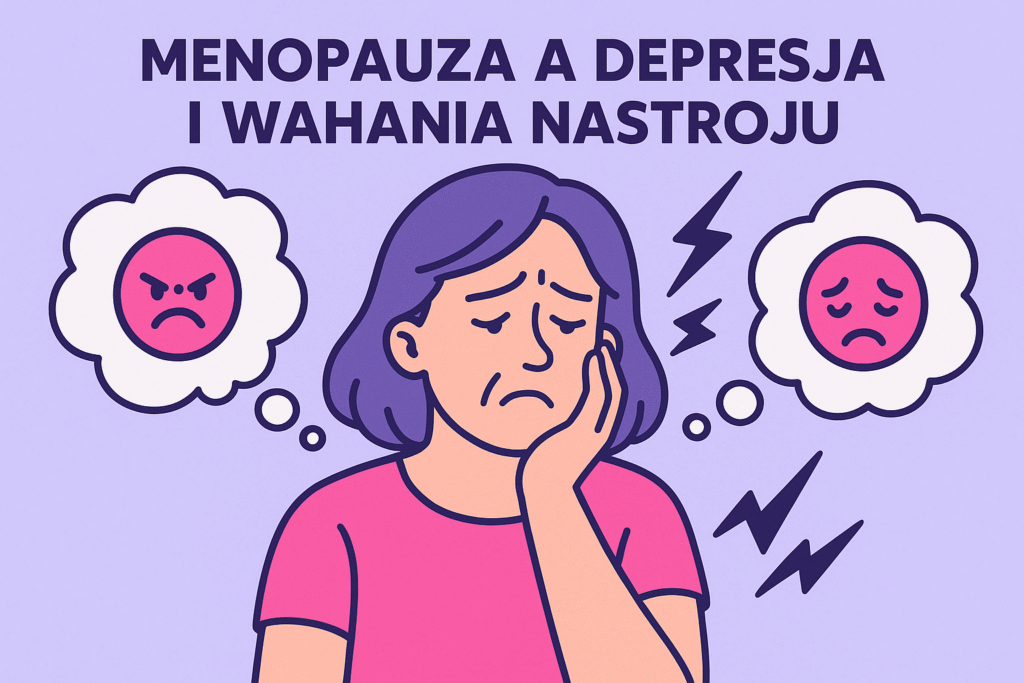Menopause is not only about physical changes but also a challenge for mental health. Many women during this period experience mood swings, low mood, irritability, a sense of being overwhelmed, and even symptoms of depression. For some, it’s the first episode of depression in their lives. Others deal with a worsening of previous emotional difficulties. Why does this happen? And what can be done about it?
How do hormones affect mood?
Estrogens play a key role in the functioning of the nervous system.
They influence:
- synthesis of serotonin and dopamine (neurotransmitters responsible for mood)
- regulation of cortisol levels (the stress hormone)
- circadian rhythms and sleep
- cognitive functions, memory, and concentration¹
During perimenopause, estrogen levels not only decline but also fluctuate abruptly. This can lead to:
- irritability and tearfulness
- mood swings and a feeling of inner tension
- loss of interest and motivation
- anxiety, insomnia, and even depressive states²
Menopausal depression – symptoms to watch out for
Symptoms of depression can be difficult to distinguish from natural menopausal changes.
Warning signs include:
- persistent overwhelming sadness throughout most of the day
- loss of interest and pleasure in daily activities
- trouble sleeping or excessive sleepiness
- lack of energy, fatigue, psychomotor slowing
- negative self-thoughts, feelings of guilt or worthlessness
- resigned thoughts, and in some cases – suicidal ideation
If symptoms last for more than 2 weeks and interfere with daily functioning, you should consult a doctor.
Who is at greater risk?
The risk of depression during menopause increases in women who:
- have a history of depression or anxiety disorders
- struggle with chronic stress or burnout
- experience severe physical menopausal symptoms (e.g., insomnia, hot flashes)
- are lonely or lack social support
- are going through other life crises: divorce, bereavement, job loss
- have undergone surgical menopause (e.g., oophorectomy)³
How to cope with mood swings and depression?
1. Physical activity
Regular aerobic exercise (walking, dancing, cycling) acts like a natural antidepressant:
- Enhances the production of endorphins and serotonin
- Reduces nervous tension and improves sleep⁴
2. A brain-supportive diet
- Omega-3 fatty acids (fatty fish, flaxseed, walnuts)
- Magnesium, zinc, B vitamins (especially B6, B12, folic acid)
- Probiotics (yogurt, fermented foods, supplements) – gut microbiome affects mood
3. Supplements and herbs
- St. John’s wort – effective for mild to moderate depression⁵
- Ashwagandha, Rhodiola rosea – adaptogens that reduce cortisol levels
- L-theanine and tryptophan – calming effect, support serotonin production
(Note: St. John’s wort interacts with many medications – do not use without medical advice.)
4. Cognitive Behavioral Therapy (CBT)
- Effective for treating depression and anxiety in menopausal women⁶
- Helps identify negative thoughts and develop new coping strategies
- Can be applied individually or in group settings
5. Meditation and relaxation techniques
- Mindfulness meditation reduces stress and improves mood
- Breathing exercises and progressive muscle relaxation (Jacobson’s method)
- Yoga and tai chi – beneficial for the nervous and hormonal systems
6. Pharmacological treatment (if other methods are insufficient)
- Antidepressants (e.g., SSRIs, SNRIs) – effective and safe in menopausal women
- Hormone replacement therapy (HRT) – may ease depressive symptoms in some women, especially if related to estrogen deficiency⁷
When to seek help?
Don’t wait for symptoms to pass on their own. See a doctor if:
- feelings of sadness or tension persist for more than 2 weeks
- you struggle to perform daily tasks
- you no longer enjoy things you used to
- you feel anxious, panicked, or have intrusive thoughts
- you experience thoughts of death or escape
Summary
Mood swings and depression during menopause are not “overreactions” but real consequences of hormonal, biological, and psychological changes. The good news is that many effective support methods exist – from movement, diet, and therapy to supplementation and medical treatment. The most important thing is not to ignore the signals from your body and mind, but to take care of yourself with the same compassion you show to others.
Przypisy
- Rubinow DR et al. Estrogen-serotonin interactions: implications for affective regulation. Biol Psychiatry. 1998.
- Freeman EW. Depression in the transition to menopause: risks and treatment options. Womens Health (Lond). 2010.
- Maki PM, Freeman EW. Depression during the perimenopause. Clin Obstet Gynecol. 2011.
- Craft LL, Perna FM. The benefits of exercise for the clinically depressed. Prim Care Companion J Clin Psychiatry. 2004.
- Linde K et al. St John’s wort for depression. Cochrane Database Syst Rev. 2008.
- Hunter MS et al. Cognitive behavioural therapy for menopausal symptoms. BMJ. 2015.
- Schmidt PJ et al. Estrogen replacement in perimenopause-related depression: a randomized controlled trial. JAMA. 2000.

